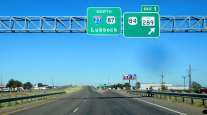DOT Rejects Pa.’s Request to Put Tolls on Interstate 80
This story appears in the April 12 print edition of Transport Topics.
The federal government last week again rejected Pennsylvania’s request to toll Interstate 80, forcing officials there to revise their long-term infrastructure program.
Transportation Secretary Ray LaHood said April 6 he was turning down Pennsylvania’s request because the state’s funding plan would have diverted toll revenue generated on
I-80 to other projects, including mass transit.
“We based today’s decision on what is allowable under federal law,” LaHood said in a statement, referring to the 2005 highway funding law that allowed for several pilot projects installing new tolls on existing interstate highways.
During a press conference the same day, Gov. Ed Rendell (D) said, “We think their legal analysis is incorrect.”
He added: “It’s over. It’s like a not-guilty verdict — you can’t appeal it.”
With the loss of the potential toll revenue, Rendell said, the state now faces a massive shortfall in transportation funding.
If the state legislature doesn’t modify Pennsylvania’s funding plan — known as Act 44 — the state will forgo about $310 million a year in highway funding and another $160 million in transit funding, Rendell said.
“The result is 12,000 jobs being lost. That’s what that extra money would have yielded,” he said.
The governor said he planned to call a special session of the state legislature soon to focus on new options to close the transportation funding shortfall.
He said the state was likely to reexamine a tax on oil company gross profits, natural-gas fees and the use of private funding.
“We’ll look at P3s — private-public partnerships — and may look at a possible lease or a partial lease of the Pennsylvania Turnpike itself,” Rendell said.
Before Act 44 was passed, the governor had agreed to a $12.8 billion lease of the turnpike, but the deal collapsed in the face of legislative opposition (10-6-08, p. 5).
Rep. Rick Geist, the top Republican on the state House’s Transportation Committee, said Pennsylvania leaders now have to “move on to other alternatives,” including public-private partnerships.
“Private-public partnerships are not a panacea,” he said, “but they certainly are a viable tool in the toolbox to fix what has become a broken infrastructure.”
House Transportation Committee Chairman Joseph Markosek (D) shared a similar sentiment.
“Anyone who thinks this will be easy or painless is wrong because we have an aging transportation infrastructure with vast needs,” he said.
Markosek added that the state needs to move “toward [funding] methods that are more predictable, equitable and in sync with inflation.”
Trucking industry officials hailed the government’s decision.
“Pennsylvania’s attempt to extract money from drivers on I-80 in order to subsidize road and transit systems in other parts of the state that provided little or no benefit to the users of I-80 is both poor public policy and illegal under federal law,” said Clayton Boyce, spokesman for American Trucking Associations.
Boyce, speaking on behalf of ATA and its state affiliate, the Pennsylvania Motor Truck Association, said the industry hoped Pennsylvania would require all transportation users, even public transit riders, to pay equitable shares for infrastructure.
“It is time to put aside expensive and economically destructive financing gimmicks such as tolling existing highways and privatization of the Pennsylvania Turnpike, and instead focus on efficient, equitable and less burdensome transportation funding mechanisms,” Boyce said.
Lisa Mullings, president of Natso Inc., formerly the National Association of Truck Stop Operators, said in a statement that tolling I-80 would have caused truckers to find alternative routes to bypass the tolls, further weakening businesses along the interstate that already are struggling.
Mullings noted that automobile drivers would have paid $25 and truck drivers $100 to cross the state using I-80.
“This is a great day for truckers all over America,” said Mike Joyce, director of legislative affairs for the Owner-Operator Independent Drivers Association, “and it is a great day for all highway users.”
During his press conference, Rendell said it is inevitable that states will be allowed to impose tolls more broadly.
“I have a prediction . . . when [the highway program] is reauthorized, they will lift the ban on tolling federal highways. They will lift the ban because there is no appetite in Washington for a gas tax,” he said. “It is one of the only ways we’re going to be able to maintain these highways, which makes this decision even more ludicrous.”



